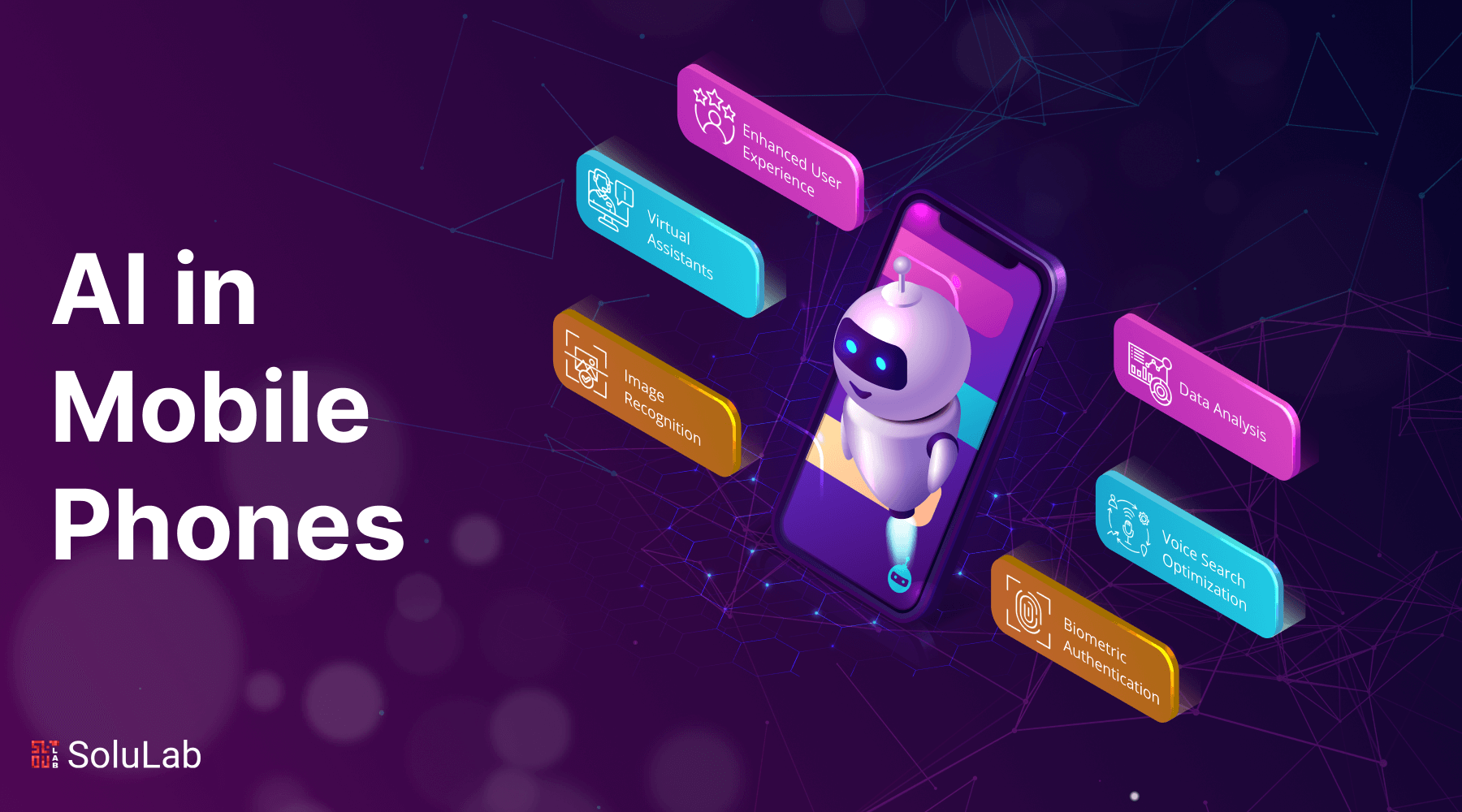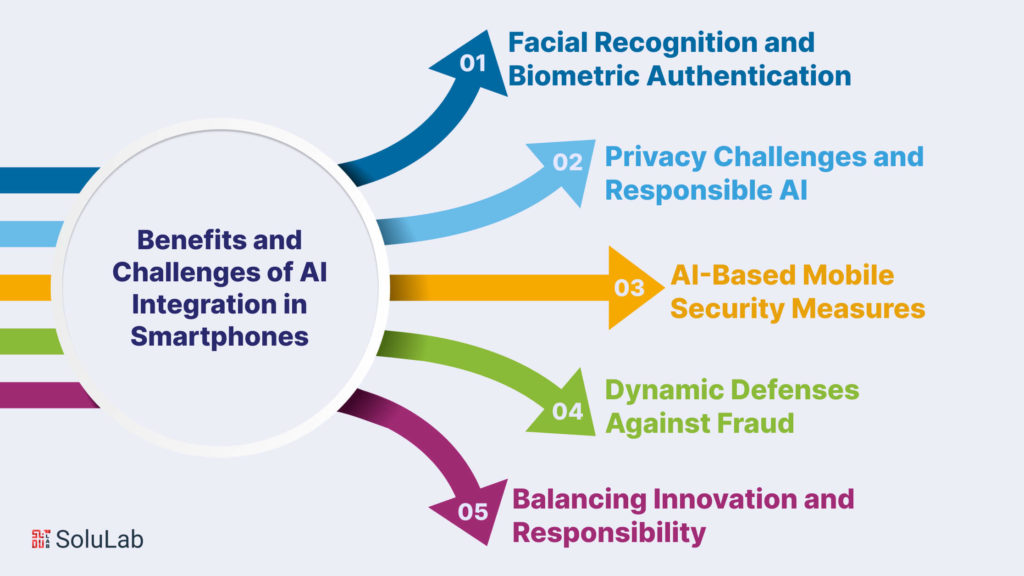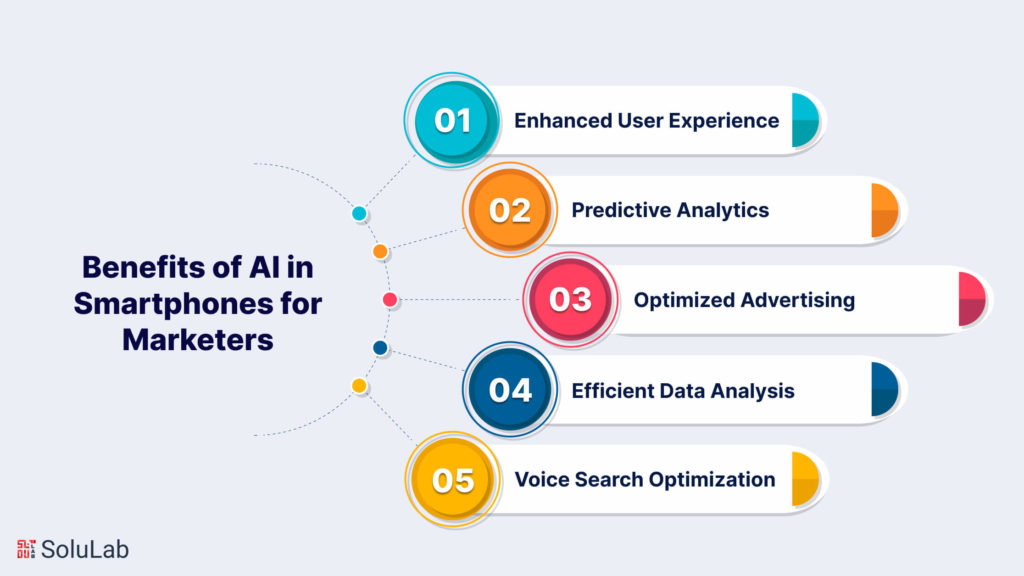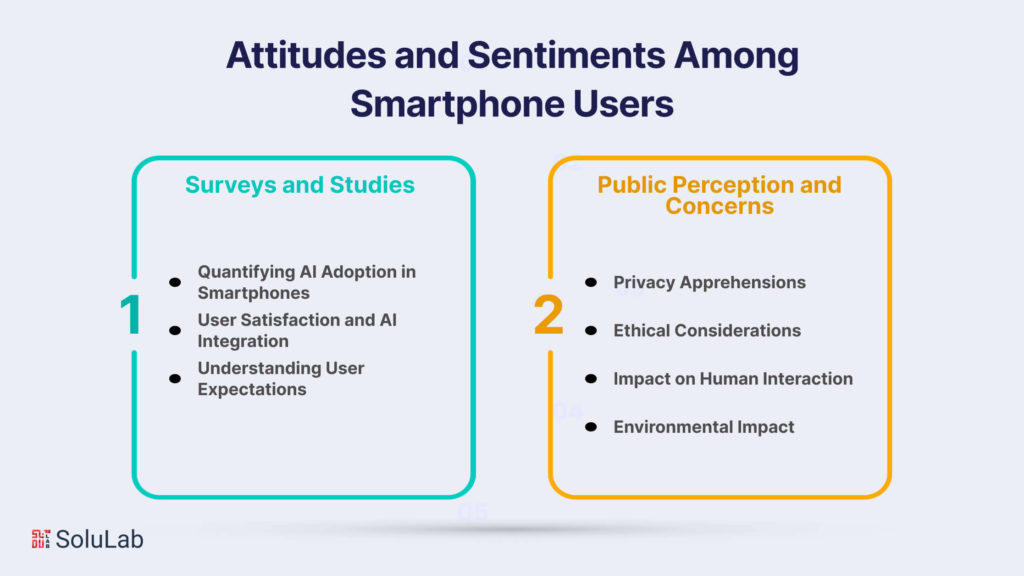
Artificial Intelligence, commonly known as AI, is the simulation of human intelligence in machines programmed to think and learn like humans. It encompasses various technologies, including machine learning, natural language processing, and computer vision, enabling machines to perform tasks that traditionally required human intelligence.
The evolution of AI in mobile phones has been a remarkable journey, transforming these devices from mere communication tools to intelligent companions. Initially, mobile phones were limited to basic functions, but with advancements in AI technology, they have become powerful computing devices. Integrating AI algorithms and capabilities has significantly enhanced user experiences, making smartphones more intuitive and adaptive.
The evolution of AI in smartphones can be traced through features like voice recognition, predictive text, and personal assistants. Today, AI is deeply embedded in mobile operating systems, enabling functions such as facial recognition, augmented reality, and adaptive performance optimization.
This blog aims to delve into the multifaceted realm of AI in mobile phones, exploring its profound impact on our daily lives. We aim to unravel the benefits of AI integration in smartphones, understanding how it revolutionizes not only communication but also various aspects of our routine tasks.
In What Ways Does AI Contribute to Enhancing Efficiency and User Satisfaction in Modern Mobile Devices?
In the rapidly evolving landscape of technology, the integration of Artificial Intelligence (AI) in mobile phones has brought about transformative changes, enhancing user experience and improving overall efficiency. The seamless integration of AI technologies in smartphones has not only elevated the capabilities of these devices but has also opened up new dimensions for innovation and user-centric functionalities.
A. Enhanced User Experience
1. Personalization
Artificial Intelligence in smartphones has paved the way for a highly personalized user experience. By leveraging advanced algorithms, AI analyzes user behavior, preferences, and usage patterns to tailor the device’s functionalities. This results in a customized interface that adapts to individual preferences, offering a more intuitive and user-friendly interaction. Personalized recommendations for apps, content, and settings contribute to a more engaging and enjoyable mobile experience.
2. Predictive Text and Suggestions
The implementation of AI-driven predictive text and suggestions has revolutionized the way users communicate on mobile devices. Through natural language processing algorithms, AI learns from users’ typing habits, predicting the next word or phrase and providing contextually relevant suggestions. This not only accelerates typing speed but also minimizes errors, significantly improving the overall efficiency of mobile communication.
B. Improved Efficiency
1. Virtual Assistants
AI-powered virtual assistants have become integral features in modern AI smartphones, offering hands-free and voice-activated functionalities. These virtual assistants, such as Siri, Google Assistant, or Bixby, leverage AI to understand and respond to user commands, perform tasks, and provide information. This not only streamlines daily activities but also enhances accessibility for users, making smartphones more than just communication devices.
2. Task Automation
Artificial Intelligence in smartphones has automated routine tasks, simplifying users’ lives and saving valuable time. AI algorithms learn from user behavior and can automate tasks such as organizing emails, setting reminders, and adjusting settings based on preferences. This automation not only boosts efficiency but also allows users to focus on more meaningful and productive aspects of their daily lives.
How Has the Integration of Artificial Intelligence Transformed the Landscape of Mobile Photography?
In the ever-evolving realm of smartphones, artificial intelligence (AI) has become a game-changer, transforming the way we capture and cherish moments. The integration of AI applications in mobile photography has paved the way for groundbreaking advancements, enhancing user experience and redefining the capabilities of smartphone cameras. This article delves into the multifaceted applications of AI in mobile photography, spotlighting key features that have revolutionized the way we interact with our smartphones.
A. Image Recognition
1. Face Detection
One of the prominent AI-driven features in mobile photography is face detection. With sophisticated algorithms, AI smartphones can now accurately identify and focus on human faces within the frame. This not only ensures sharp and well-exposed portraits but also facilitates features like automatic face tagging and beautification, contributing to a seamless and personalized photography experience.
2. Object Recognition
AI’s prowess extends beyond human faces to encompass object recognition, elevating mobile photography to new heights. Smartphones equipped with AI can identify various objects in the frame, allowing for intelligent scene optimization. This feature enhances the overall image quality by adjusting settings based on the recognized objects, ensuring vibrant and well-balanced photographs.
B. AI-driven Camera Features
1. Portrait Mode
AI’s impact on portrait photography is undeniable, with the introduction of Portrait Mode being a testament to its capabilities. By leveraging advanced depth-sensing algorithms, smartphones equipped with AI can simulate the shallow depth of field seen in professional DSLR cameras. This creates stunning bokeh effects, highlighting the subject while blurring the background for captivating and visually striking portraits.
2. Night Mode
Capturing memorable moments in low-light conditions has been a perpetual challenge for smartphone photographers. However, AI-driven Night Mode has emerged as a transformative solution. By employing intricate algorithms, AI smartphones can now capture bright and detailed images even in challenging lighting scenarios. This feature optimizes exposure, reduces noise, and enhances overall image quality, ensuring that users can immortalize nighttime scenes with unparalleled clarity.
The incorporation of AI in smartphones has not only introduced these innovative features but has also revolutionized the way users engage with their devices.
Know More: AI in software development:
What are the Key Benefits and Privacy Challenges Associated with AI Integration in Smartphones?

-
Facial Recognition and Biometric Authentication
In the quest for robust mobile security, facial recognition, powered by AI-driven biometric authentication, emerges as a pioneering solution. By analyzing unique facial features, this technology ensures secure access to smartphones, elevating user authentication and fortifying devices against unauthorized access. However, as the benefits of AI in smartphones become apparent, it is crucial to address emerging privacy concerns associated with the processing and storage of facial data.
-
Privacy Challenges and Responsible AI
While AI enhances mobile security, privacy challenges loom large. Striking a delicate balance between the advantages of AI in smartphones and safeguarding user data is imperative. Responsible AI practices, coupled with collaboration between developers and policymakers, can establish robust frameworks for the ethical use and secure storage of sensitive facial data, ensuring user privacy is upheld.
-
AI-Based Mobile Security Measures
AI’s role in smartphones extends beyond facial recognition to encompass proactive threat detection and fraud prevention. Through advanced algorithms, smartphones analyze user behavior and network activities, identifying anomalies indicative of potential security threats. This dynamic approach to security ensures real-time monitoring and equips devices to evolve with the ever-changing landscape of emerging threats.
-
Dynamic Defenses Against Fraud
Mobile devices are vulnerable to various forms of fraud, from phishing attacks to financial scams. AI’s integration in smartphones empowers these devices to recognize and mitigate fraudulent activities effectively. Machine learning algorithms continuously adapt to new fraud patterns, providing users with dynamic defenses that keep pace with emerging threats, ensuring a secure digital environment.
Related: Use Cases Of AI Agents
-
Balancing Innovation and Responsibility
The integration of AI in smartphones heralds a new era of enhanced security, demanding a careful balance between innovation and responsibility. As we navigate the benefits of AI in smartphones, addressing privacy concerns and establishing ethical standards becomes paramount. By harnessing the power of AI technology responsibly, we can create a secure digital environment that fosters innovation while safeguarding user privacy in the ever-evolving landscape of mobile technology.
What are the Key Challenges and Ethical Considerations Associated with the Integration of AI in Mobile Phones?
Artificial Intelligence (AI) has seamlessly integrated into various aspects of our lives, with smartphones becoming prominent platforms for AI implementation. While the benefits are undeniable, it is crucial to address the challenges and ethical considerations that arise in this ever-evolving landscape.
A. Bias in AI Algorithms
One pressing concern in the realm of AI on mobile phones is the potential bias ingrained in algorithms. The algorithms driving AI technologies may inadvertently reflect and perpetuate societal biases. This bias could lead to unfair outcomes, particularly in areas like facial recognition, where certain groups may be disproportionately affected. Addressing algorithmic bias requires constant vigilance, diverse data sets, and ongoing refinements to ensure fairness and equity.
B. Privacy Issues
The integration of AI in smartphones raises significant privacy concerns. The collection and analysis of vast amounts of personal data for AI algorithms can lead to potential breaches and misuse. Striking a balance between leveraging AI for personalized experiences and safeguarding user privacy is crucial. Implementing robust encryption, transparent data usage policies, and user consent mechanisms are essential to mitigate these concerns and build trust among smartphone users. Additionally, upholding the right to be forgotten allows users to control their data and request the removal of personal information when appropriate.
C. Job Displacement Concerns
The widespread adoption of AI in smartphones has sparked concerns about job displacement. Automation and AI-driven processes may replace certain human tasks, impacting employment opportunities in traditional sectors. It is imperative for policymakers and industry leaders to proactively address these concerns by fostering educational programs and creating a workforce that can adapt to the changing landscape. Striking a balance between technological advancements and employment sustainability is crucial for societal well-being.
Read Also: AI Model Training
What Does AI on Mobile Technology Mean For Marketers?
In recent years, the integration of Artificial Intelligence (AI) into mobile technology has reshaped the landscape for marketers, opening up new possibilities and enhancing user experiences. The convergence of AI and smartphones has given rise to a range of innovations, from AI-powered personal assistants to advanced image recognition capabilities, providing marketers with powerful tools to engage and connect with their audience.
1. AI in Smartphones: A Game-Changer for Marketers
The term “AI in smartphones” encompasses a myriad of applications that have become integral to the marketing strategies of forward-thinking businesses. From predictive analytics to machine learning algorithms, smartphones equipped with AI capabilities enable marketers to analyze vast datasets and gain valuable insights into consumer behavior. This, in turn, facilitates the creation of targeted and personalized marketing campaigns that resonate with individual preferences.
2. Benefits of AI in Smartphones for Marketers

The incorporation of AI in smartphones yields several benefits for marketers:
-
Enhanced User Experience
AI-driven features, such as AI-powered chatbots and virtual assistants, provide users with personalized interactions, enhancing their overall experience with a brand.
-
Predictive Analytics
Marketers can leverage AI algorithms to predict consumer trends and behaviors, enabling them to stay ahead of the curve and tailor their strategies accordingly.
-
Optimized Advertising
AI enables precise ad targeting by analyzing user preferences and behavior, ensuring that advertisements are relevant and timely, leading to higher engagement rates.
-
Efficient Data Analysis
AI automates the analysis of vast datasets, allowing marketers to extract actionable insights swiftly and make data-driven decisions.
-
Voice Search Optimization
With AI-powered voice recognition technology becoming commonplace in smartphones, marketers can optimize content for voice search, catering to the growing number of users relying on voice commands.
As AI technology continues to evolve, the capabilities of mobile phones are expected to expand further. Marketers should anticipate the integration of more sophisticated AI features, such as augmented reality and natural language processing, into smartphones.
What Role Does the Convergence of AI and AR/VR Play in Revolutionizing User Experiences on Smartphones?
In the ever-evolving landscape of mobile technology, Artificial Intelligence (AI) is poised to revolutionize the capabilities of smartphones, ushering in a new era of innovation and user experience. As we navigate the future of AI in mobile phones, three prominent trends are set to reshape the landscape:
A. Integration with 5G Technology
The synergy between AI and 5G technology is a pivotal stride toward enhancing the performance of mobile phones. The integration of AI algorithms with 5G networks enables faster data processing, lower latency, and improved connectivity. This symbiotic relationship not only facilitates seamless communication but also empowers AI applications on smartphones to leverage high-speed data transfer for real-time processing.
B. Augmented Reality (AR) and Virtual Reality (VR)
The convergence of AI and AR/VR is a game-changer, bringing immersive experiences to the palm of our hands. Smartphones equipped with AI-driven AR and VR technologies can create interactive and lifelike simulations, blurring the lines between the digital and physical realms. Users can expect a surge in AI-enabled applications, from augmented navigation to virtual shopping experiences.
C. Continued Advances in Natural Language Processing
The evolution of Natural Language Processing (NLP) continues to be a focal point in AI development for mobile phones. AI-driven voice assistants and language understanding capabilities are becoming increasingly sophisticated, enabling AI smartphones to comprehend and respond to human language nuances..
In conclusion, the future of AI in mobile phones is bright, with integration, AR/VR, and NLP leading the charge. The strategic fusion of AI with 5G technology, coupled with immersive AR/VR experiences and refined NLP capabilities, positions smartphones at the forefront of technological innovation.
What are the Prevailing Attitudes and Sentiments Among Smartphone Users?

Artificial Intelligence (AI) has ushered in a new era of technological sophistication, and nowhere is this more evident than in the realm of mobile phones. In our exploration of User Perspectives on AI in Mobile Phones, we navigate through the intricate interplay of technological advancements and human experiences. This section delves into the insights gleaned from surveys and studies, shedding light on the dynamic landscape of AI adoption in smartphones.
Additionally, we unravel the fabric of public sentiment and concerns surrounding the integration of AI into these ubiquitous devices, touching on privacy apprehensions, ethical considerations, and the broader societal impact.
A. Surveys and Studies
-
Quantifying AI Adoption in Smartphones
Surveys conducted on smartphone users reveal a growing acceptance of AI technology. Respondents highlight the convenience of AI features, such as predictive text, voice recognition, and building intelligent personal assistants.
-
User Satisfaction and AI Integration
Studies delve into user satisfaction levels concerning AI-infused applications in mobile phones. Positive feedback centers on enhanced user experiences, improved efficiency, and the seamlessness of AI integration into everyday tasks.
-
Understanding User Expectations
Surveys investigate user expectations regarding future AI advancements in smartphones. Anticipated features include more intuitive voice commands, context-aware personalization, and AI-driven health monitoring applications.
Related: Impact of AI on Copywriting
B. Public Perception and Concerns
-
Privacy Apprehensions
Public perception of AI in smartphones is not without reservations. Concerns about data privacy and security emerge prominently, with users expressing anxiety about the potential misuse of personal information by AI algorithms.
-
Ethical Considerations
The ethical implications of AI in smartphones come under scrutiny. Public discourse focuses on issues like algorithmic bias, accountability, and the need for transparent AI decision-making processes in mobile applications.
-
Impact on Human Interaction
The perception of AI altering human interaction patterns is explored, with discussions on the balance between AI-driven automation and the preservation of genuine human connections.
Check Our Case Study: SoluLab and AI-Build
-
Environmental Impact
Public concerns extend to the environmental impact of AI technology in smartphones. Discourse includes discussions on the energy consumption of AI algorithms and the development of eco-friendly AI development solutions.
As smartphones continue to integrate AI technology, user perspectives play a crucial role in shaping the future of mobile innovation. Balancing the benefits of AI in smartphones, such as improved efficiency and personalized experiences, with addressing user concerns around privacy and ethical considerations, remains a challenge for the industry. This ongoing dialogue between users, developers, and policymakers will shape the evolution of AI in mobile phones, ensuring a symbiotic relationship between technology and human values.
Conclusion
To summarize, incorporating artificial intelligence (AI) into mobile phones has several benefits, including transforming user experiences and improving gadget capabilities. From tailored suggestions to efficient virtual assistants, AI puts convenience and productivity at our fingertips. However, it is critical to negotiate the ethical and privacy considerations associated with AI deployment in mobile devices, guaranteeing openness and user control over data use. With careful study and appropriate development, artificial intelligence in mobile phones has the ability to drive innovation and improve our daily lives.
SoluLab, an AI development company, is a pioneer in creating innovative solutions that are suited to the unique demands of its clients. SoluLab focuses on innovation and quality, leveraging its AI skills to produce intuitive and compelling mobile applications. SoluLab’s collaborative approach and commitment to customer satisfaction enable organizations to realize the full potential of AI, bringing thoughts into reality and fostering long-term success in the mobile technology environment.
FAQs
1. What is AI in smartphones?
Artificial Intelligence (AI) in smartphones refers to the integration of advanced machine learning algorithms and computational capabilities in mobile devices to enhance their functionality and performance.
2. How does AI technology benefit mobile phones?
AI in smartphones offers numerous benefits, including improved user experience, enhanced performance, intelligent voice assistants, efficient power management, and personalized content recommendations.
3. What are the key features of AI in smartphones?
Key features of AI in smartphones include facial recognition, natural language processing, image recognition, predictive text input, smart cameras, and the ability to adapt to user behavior over time.
4. How does AI contribute to better camera performance in smartphones?
AI-powered cameras in smartphones can analyze scenes in real-time, optimize camera settings, and enhance image quality by recognizing objects, adjusting focus, and applying post-processing effects for stunning photos.
5. Are AI-powered voice assistants in smartphones secure?
Yes, AI-driven voice assistants use advanced security protocols to protect user data. Manufacturers employ encryption and secure connections to ensure the privacy and safety of user interactions.
6. Can AI technology in mobile phones improve battery life?
Absolutely. AI algorithms optimize power consumption by intelligently managing background processes, resource allocation, and app usage, resulting in extended battery life.






